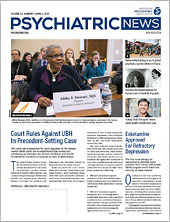In 2016 APA and the Academy of Psychosomatic Medicine—now the Academy of Consultation-Liaison Psychiatry (ACLP)—jointly published a monograph titled Dissemination of Integrated Care Within Adult Primary Care Settings: The Collaborative Care Model. This important work highlighted the evidence supporting the clinical and financial effectiveness of the Collaborative Care Model, which emphasizes four core elements: team driven, population focused, measurement guided, and evidence based.
The model has been successfully implemented in many outpatient and inpatient settings. The key role of consultation-liaison (C-L) psychiatrists in the model has been repeatedly demonstrated. They have been leaders in the development, research, implementation, and dissemination of collaborative care in primary care settings. C-L psychiatry training is embedded in medical, surgical, rehabilitative, and emergency settings, optimizing C-L psychiatrists’ abilities to contribute to and thrive in integrated care environments.
As the Collaborative Care Model has evolved and matured and been disseminated in recent years, C-L psychiatrists have expanded their participation in the model in primary care settings and an increasing number of specialty care settings. The theme of ACLP’s annual meeting in November 2018 was “Branding C-L Psychiatry: Defining the Breadth and Depth of Our Subspecialty.” ACLP has more than 20 special interest groups representing work in a wide array of medical and surgical specialty settings, in addition to primary care settings (see
https://www.clpsychiatry.org/sigs/).
The specialty care conditions and settings that have increasing evidence to support the use or adaptation of the Collaborative Care Model include chronic pain, asthma, obstetrics and gynecology (OB/GYN), HIV/AIDS, oncology, cardiology, Medicaid health homes, and other settings where there is a high prevalence of chronic disease. Collaborative care in OB/GYN settings is particularly effective for socioeconomically disadvantaged women. In the Veterans Health Administration, treating depression in HIV/AIDS clinics was shown to be more effective when collaborative care principles were applied than in usual consultative care. A meta-analysis of the effectiveness of collaborative care in oncology settings replicated results from previous studies of the model in primary care, including positive effects on clinical outcomes, adherence, cost-effectiveness, and satisfaction. Several benefits of integrating psychiatric care into cardiology practice have been identified, such as addressing depression, anxiety, and acute stress symptoms in implanted defibrillator patients, especially if their defibrillator fires. What each of these examples has in common is adherence to collaborative care principles as noted above. The importance of psychiatrists’ roles in collaborative care is proven, and the training and experience of C-L psychiatrists prepare them to be effective in helping manage complex patients with chronic disease and comorbidities as key members of specialty medical teams.
New developments in C-L psychiatry practice further enhance the effectiveness of psychiatric integration into medical specialty, primary care, and chronic care settings. The concepts of proactive psychiatric consultation and intensive consultation for complex patients focus the skills and abilities of C-L psychiatrists on large numbers of previously unidentified patients and the most complex patients. Proactive consultation is an example of utilizing principles of population health and identifying patients at risk rather than waiting for them to present. This can be done by reviewing medical records of a population at risk (for example, those admitted to a medical unit, enrolled in an HIV/AIDS program, or identified as asking about bariatric surgery) to identify candidates for psychiatric intervention before symptoms worsen. For example, a patient whose health issues suggest a strong indication for bariatric surgery needs acute intervention to address unresolved psychological issues related to remote sexual abuse and current alcohol problems to qualify as a good surgical candidate. Proactive consultation can improve outcomes in primary, secondary, and tertiary prevention.
Intensive consultation for complex patients focuses on a higher level of psychiatric services for complex medical-surgical patients. Examples discussed by key leaders in this area (Steven Frankel, M.D., and James Bourgeois, M.D.) include poststroke patients with complicated psychosocial situations, families opposed to physician recommendations for end-of-life management, a quadriplegic patient with pain management progressing to opiate addiction, and a posttraumatic stress disorder patient with a history of traumatic head injury who self-medicated with alcohol and pain medications given by a pain program for chronic neuropathic pain. C-L psychiatrists help these complex patients by suggesting pharmacological consolidations to better address the target issues, coordinating care among different clinical services and the pharmacy, providing motivational interviewing and other types of psychotherapy to the patient and the family, and supporting the treating providers when care progression is slow and frustrating. These are the challenging types of patients whom C-L psychiatrists are often preferentially called upon to see.
There are not enough C-L psychiatrists to provide direct consultative care to the large populations of outpatient and inpatient medical-surgical patients. Combining the training and skills of C-L psychiatrists with the population health techniques of collaborative care, proactive psychiatric consultation, and intensive consultation for complex patients leverages their capabilities across a number of health care settings. ■
“Dissemination of Integrated Care Within Adult Primary Care Settings: The Collaborative Care Model” can be accessed
here.


